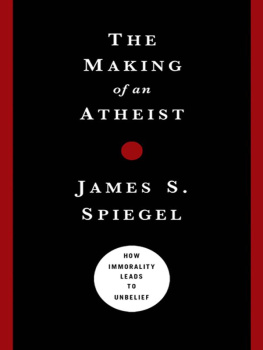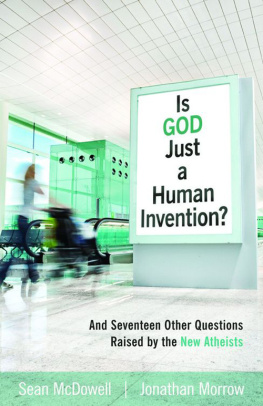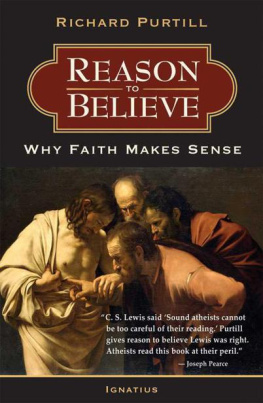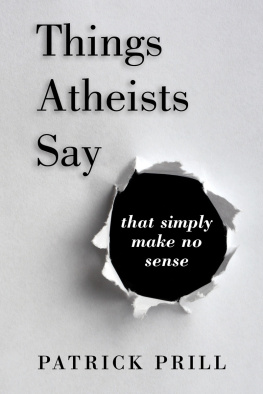The Making of an Atheist is a helpful book that introduces the reader to a biblical analysis of the nature and roots of unbelief. While not disparaging the use of apologetics in laying out a case for theism, Spiegel shows that the central issues influencing disbelief are often more a matter of a commitment to moral and spiritual independence than to an objective assessment of the evidence.
Greg Ganssle, Yale University department of philosophy and the Rivendell Institute
Most of the work being done today in response to atheism focuses on intellectual issues and arguments against belief in God. In The Making of an Atheist, James Spiegel has crafted a clear, crisp, compelling case that there are non-rational moral and psychological dynamics that lead to unbelief. Rooted in Scripture and argued with the precision of a trained philosopher, this powerful little book is a must read for theists and atheists alike!
Chad Meister, Bethel College philosophy professor, author of Building Belief and co-editor of God Is Great, God Is Good
T HE
M AKING
of an
A THEIST

J AMES S .
S PIEGEL

M OODY P UBLISHERS
CHICAGO
2010 by
J AMES S. S PIEGEL
All rights reserved. No part of this book may be reproduced in any form without permission in writing from the publisher, except in the case of brief quotations embodied in critical articles or reviews.
Scripture taken from the Holy Bible, New International Version. NIV. Copyright 1973, 1978, 1984 by International Bible Society. Used by permission of Zondervan. All rights reserved.
All websites listed herein are accurate at the time of publication, but may change in the future or cease to exist. The listing of website references and resources does not imply publisher endorsement of the sites entire contents. Groups, corporations, and organizations are listed for informational purposes, and listing does not imply publisher endorsement of their activities.
Published in association with the literary agency of Wolgemuth & Associates, Inc.
Editor: Christopher Reese
Interior Design: Ragont Design
Cover Design: Connie Gabbert, The Design Works Group
Library of Congress Cataloging-in-Publication Data
Spiegel, James S., 1963
The making of an atheist : how immorality leads to unbelief / James S. Spiegel.
p. cm.
Includes bibliographical references.
ISBN 978-0-8024-7611-1
1. Atheism. I. Title.
BL2747.3.S695 2010
239.7dc22
2009045673
We hope you enjoy this book from Moody Publishers. Our goal is to provide high-quality, thought-provoking books and products that connect truth to your real needs and challenges. For more information on other books and products written and produced from a biblical perspective, go to www.moodypublishers.com or write to:
Moody Publishers
820 N. LaSalle Boulevard
Chicago, IL 60610
1 3 5 7 9 10 8 6 4 2
Printed in the United States of America
This book is dedicated
to Alvin Plantinga
a gigantic intellect
with a humble heart
CONTENTS
INTRODUCTION
There is no one thing whatsoever more plain and manifest, and more demonstrable, than the being of God. It is manifest in ourselves, in our bodies and souls, and in everything about us wherever we turn our eye, whether to heaven, or to the earth, the air, or the seas. And yet how prone is the heart of man to call this into question! So inclined is the heart of man to blindness and delusion, that it is prone to even atheism itself.
Jonathan Edwards
Mans Natural Blindness in Religion
THE NEW ATHEISTS are on the warpath. They come armed with arguments to show that belief in God is absurd and dangerous. They promote purging the world of all religious practice. And they claim that people of faith are mentally ill. Richard Dawkins calls God a delusion and Christopher Hitchens declares that religion poisons everything.
These are strong, disturbing claims. The new atheists do offer arguments to back up their proclamationsat least their less inflammatory claims. Unfortunately for them, they merely rehearse the same tired objections that have been offered up by skeptics many times beforearguments that have been repeatedly rebutted by philosophers and theologians, both Christian and non-Christian. There is really nothing new about the new atheism, except the degree of bombast in their claims. Their prose seethes with outrage. Their anger and resentment toward all things religious is palpable.
Yet the new atheists present themselves as having arrived at their conclusions through intellectual inquiry. And Christian apologists have been quick to respond to their arguments. Indeed, it is tempting just to offer more of the same here. But this book has a different purpose. I want to show that atheism is not ultimately about arguments and evidence. The candid remarks of atheist philosopher Thomas Nagel are telling:
I want atheism to be true and am made uneasy by the fact that some of the most intelligent and well-informed people I know are religious believers. It isnt just that I dont believe in God, and, naturally, hope that Im right about my belief. Its that I hope there is no God! I dont want there to be a God; I dont want the universe to be like that.
These comments by Nagel, as well as those above by Harris and Dawkins, reveal strong emotions. Could it be that their opposition to religious faith has more to do with the will than with reason? What if, in the end, evidence has little to do with how atheists arrive at their anti-faith? Perhaps we should consider the possibility that skeptical objections are the atheists faade, a scholarly veneer masking the real causes of their unbeliefcauses that are moral and psychological in nature. That is precisely my aim in this book. Atheism is not at all a consequence of intellectual doubts. Such doubts are mere symptoms of the root causemoral rebellion. For the atheist, the missing ingredient is not evidence but obedience.
The irrational heights to which the new atheists are willing to go in order to resist God are never more plain than in Richard Dawkinss speculation regarding lifes origins:
If it were ever shown that life on this planet was designed then I would say it must have been some extraterrestrial intelligence, perhaps following Francis Cricks suggestion of directed panspermia that life might have been seeded on Earth in the nose cone of a rocket sent from a distant civilization that wanted to spread its form of life around the universe.
Dawkins appeals to little green men as the creators of life on Earth, yet he calls theists delusional? What could inspire such silly thinking? How could an otherwise intelligent person propose this B-movie science fiction plot as a plausible theory? It certainly indicates that something other than a rational, dispassionate review of evidence is at work behind the thinking of Dawkins and the new atheists.
Atheism, of course, is nothing new. The biblical writers were just as aware of religious skeptics as believers are today. It is instructive to note the scriptural account of atheism. The psalmist says, The heavens declare the glory of God; the skies proclaim the work of his hands (Psalm 19:1), yet we are reminded that the fool says in his heart, There is no God (Psalm 14:1a). Why? Because they are corrupt, their deeds are vile (Psalm 14:1b). In the New Testament we find precisely the same diagnostic. The apostle Paul does not mince words in making clear that lack of evidence is not the atheists problem. Like the psalmist, Paul references the overwhelming proof of the reality of God:
Next page











